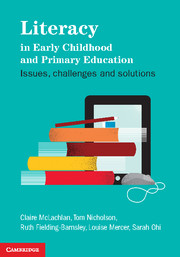Book contents
- Frontmatter
- Contents
- List of figures
- List of tables
- About the authors
- Acknowledgements
- Chapter 1 Introduction
- Part 1 Literacy acquisition: the child, the family and diversity in the modern world
- Chapter 2 Literacy acquisition in the early years: past, present and future
- Chapter 3 When should children start literacy learning?
- Chapter 4 Family literacies and relationships with centres and schools
- Chapter 5 Multiliteracies: growing the next generation of readers
- Chapter 6 Diverse classrooms and learning in bilingual and multicultural/multilingual settings
- Part 2 Learning about literacy in early childhood settings
- Part 3 Literacy learning in the primary school
- Part 4 Literacy learning in the senior primary school
- References
- Index
- References
Chapter 5 - Multiliteracies: growing the next generation of readers
from Part 1 - Literacy acquisition: the child, the family and diversity in the modern world
- Frontmatter
- Contents
- List of figures
- List of tables
- About the authors
- Acknowledgements
- Chapter 1 Introduction
- Part 1 Literacy acquisition: the child, the family and diversity in the modern world
- Chapter 2 Literacy acquisition in the early years: past, present and future
- Chapter 3 When should children start literacy learning?
- Chapter 4 Family literacies and relationships with centres and schools
- Chapter 5 Multiliteracies: growing the next generation of readers
- Chapter 6 Diverse classrooms and learning in bilingual and multicultural/multilingual settings
- Part 2 Learning about literacy in early childhood settings
- Part 3 Literacy learning in the primary school
- Part 4 Literacy learning in the senior primary school
- References
- Index
- References
Summary
Chapter objectives
To define and examine the concept of multiliteracies.
To consider the notion of literacy in a changing world.
To reconceptualise literacy in the classroom.
This chapter explores multiliteracies as part of examining how children come to centres and schools with diverse literacy experiences, which may or may not match the literacy environment of the centre or school. The chapter encourages students and teachers to reconsider how the nature of readers and the contexts in which reading occurs are changing with the advent of technology. Ideas to support an ever-increasing array of text types and multimodal applications for various ages in the classroom are investigated.
What are multiliteracies?
The term multiliteracies is used to capture the complexities of the range of types of texts in which gestural, spatial, verbal and visual elements are included and which use a wide range of communication channels that inl uence people’s literate practices (New London Group 1996; Makin, Jones Diaz & McLachlan 2007). People today live in an increasingly globalised world, in which finance, global capital, trade, information, communication and media technologies merge across economic, political, cultural and social i elds, all requiring understandings of specific forms of literacy. People of all ages, including children, are drawn into globalisation, consumerism and interaction with technology, media and communication systems. Globalisation has led to shifting conceptions of what constitutes literacy and this shift in thinking has important implications for teaching the next generation of children. New technologies emerge daily, bringing with them new everyday functional community literacies, such as changes in the internet, email, MP3s, mobile phones, electronic maps, signs and advertising. The internet, according to an advertisement on New Zealand television at the moment, has been in New Zealand for more than 20 years; in this period it has brought about enormous changes in the ways people connect, interact and communicate.
- Type
- Chapter
- Information
- Literacy in Early Childhood and Primary EducationIssues, Challenges, Solutions, pp. 65 - 81Publisher: Cambridge University PressPrint publication year: 2012



